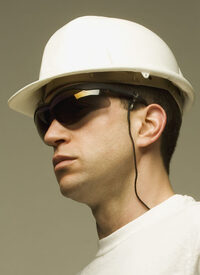 Have a read below to find answers to some of the commonest questions we are asked about PPE (Personal Protective Equipment). Hopefully, you will find what you are looking for. If your question is not answered, or for further information, please don’t hesitate to get in touch with one of our friendly team, and we will be happy to provide you with the answers you need.
Have a read below to find answers to some of the commonest questions we are asked about PPE (Personal Protective Equipment). Hopefully, you will find what you are looking for. If your question is not answered, or for further information, please don’t hesitate to get in touch with one of our friendly team, and we will be happy to provide you with the answers you need.
1) What is PPE?
PPE is any equipment that protects employees against potential health and safety risks while they are engaged in their work duties. The regulations state that the PPE should be provided “as a last resort”, the term includes but is not limited to:
- Safety Helmets
- Gloves
- Eye Protection
- High Visibility Clothing
- Safety Footwear and Harnesses
- Respiratory Protective Equipment (RPE)
The onus is on the employer to ensure the correct equipment and training is provided for employees and that the workforce understands the necessity for the equipment. This extends to storing and keeping the equipment fit for purpose. For example, employees who have been handling solvents may need special training in how to remove gloves without damaging their skin, why they have to take care and what to do if accidents occur.
2) Why is PPE important?
Put simply, the provision of PPE improves workplace safety and therefore long-term productivity. In addition, it means that employees will feel more confident especially if the provision is intertwined with instructions on procedures training and clear protocols are in place should the worst happen. The whole point of providing PPE is to reduce the risk of this happening in the workplace. Overall, it is good for business and is good for employees and employers alike.
3) Can an employer charge for PPE?
There are no circumstances where an employer can deduct wages or earnings for PPE. This includes any propositions to return funds when a contract or job is completed. This remit covers agency and temporary workers if the staff are legally seen as employees of the company and not the agency. There is one exception. If the employment is terminated and the employee keeps the PPE, then the employer has recourse to deduct the cost of PPE from the last wages. In this circumstance, the onus is on the employer to make this explicit in any contract or paperwork pertaining to the employee’s terms and conditions of employment.
4) Are there any circumstances where PPE at work regulations do not apply?
The short answer is yes. If there is any doubt within the following framework, further legal advice should be sought. The regulations exempt from PPE are:
- The Control of Lead at Work Regulations 2002.
- The Control of Noise at work Regulations 2005.
- The Ionising Radiation Regulations 1999.
- The Control of Asbestos Regulations 2012.
- The Control of Substances Hazardous to Health Regulations 2002 (COSHH as amended).
For example, an employer whose core business involves handling potentially dangerous chemicals needs to ensure that the PPE is fit for purpose and covered by the COSHH 2002 regulations.
5) How do I know that the PPE is of the right standard?
To be covered by legislation ALL PPE equipment must be marked “CE” as required by the PPE regulations 2002. Reputable suppliers will have this as standard and will advise you. However, if there is any doubt, further legal advice should be sought. The CE stamp indicates that the item of PPE complies with the 2002 regulatory framework. In addition, the item may be likely to have been tested and certified by an independent agency (non-employment). Finally, it is the responsibility of the employer to ensure that the PPE suits the user; meaning that is it is of the right size and weight. Therefore, it is probably a good idea to involve employees and / or their representatives in the procurement process.
Author bio:
David James is an avid writer and has worked in the health and safety business for several years. Having witnessed many accidents and near misses he tries to promote health and safety through Sandycroft Workwear; a firm that sells a wide range of personal protective equipment keeping employees safe.